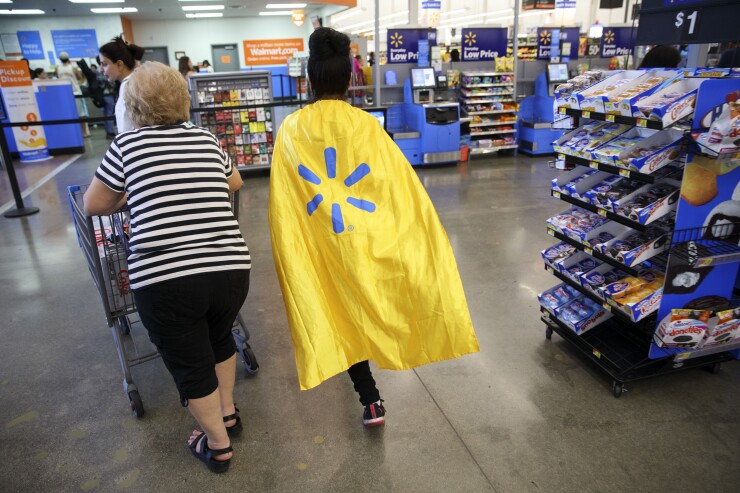There are subtle differences in Walmart's virtual currency project compared to Facebook's Libra, but these may be enough to avoid the regulatory firing squad that Facebook has endured.
Walmart's foray into crypto is still limited to a
While Walmart's patent application describes uses close enough to traditional banking to draw attention from regulators, the same descriptions are narrow enough to avoid claims that it's subverting government authority—which has been the impetus for much of the

"Walmart, ostensibly, would be subject to similar regulatory scrutiny as Libra when it comes to securities, money transmission, privacy and cybersecurity compliance, but I don’t see its digital currency being subject to the same kind of backlash that Libra has experienced, principally because of its more limited and defined reach and purpose, which does not appear to present a challenge to central banks and monetary policy," said Sam Miller, a partner at Rimon Law in Los Angeles, with practice group and client sectors including fintech and cryptocurrencies.
Based on the information that's available, Walmart's proposal would be targeted to address payment issues and inefficiencies within its stores and certain partner stores, allowing Walmart customers to exchange cash for a Walmart "coin" and use that for purchases, Miller said. "Unlike Libra, though, this seems to be a largely store-wide payment system rather than a universally used digital currency and outright challenge to established currency."
But the retailer has never followed through, partly because of the heavy regulatory burden. Instead, Walmart has used workarounds to offer financial services through collaborations with prepaid card issuer
Walmart's potential coin looks and acts enough like a bank to resurrect regulators' concerns, particularly given its past attempts to get around interchange fees.
Walmart's been down this road before with the now-defunct Merchant Customer Exchange, a network of retailers that hoped to counter credit card fees. Libra has not made this direct assault on interchange a large part of its presentation, but Walmart's patent language and its past with MCX invites pressure from bank regulators and the banking lobby.
Walmart may engage in banking the currency underlying its coin by paying interest on funds deposited, which is something Libra steered clear of in it is efforts to promote Libra as a currency not subject to banking oversight, Miller said.
"Being essentially a store payment system and store of value, it would, one can assume, be directed at reducing customer credit card fees and saving on the considerable interchange fees which Walmart pays," he said.
Walmart did not return requests for comment. Beyond regulatory and political issues, there are structural differences between the Walmart currency described in the patent application and Facebook's vision for Libra.
Walmart is describing a stablecoin on a permissioned network, which is narrower and with a more limited Walmart-focused use case than Libra, which has a network of partners and more open access, said Filipe Castro, a co-founder and CIO at UTrust, a Zug, Switzerland-based cryptocurrency payment company.
Walmart would also be pegged to U.S. dollars rather than an international group of currencies, a decision that impacts regulations. Japanese regulators, for example, have expressed concerns about Facebook's basket of backing currencies, contending that this plan complicates regulation since Libra can't be tied to a single traditional currency.
"Both initiatives, however, align with the trends towards e-money and digital currencies as a means of payment," Castro said. "We envision this to be only one of many initiatives endorsed by players in the industry, with other consortiums working on competing currencies and trying different models."
Walmart's political ride may also eased by not having the association of misusing its customers' data, said Mike Minihan, a partner and tax specialist at BX3 Capital, a New York-based advisory firm.
Some of Libra's political problems have little to do with cryptocurrency and more to do with Facebook itself. The social network was connected to the
"All of this said, there is a lot of good that can come from projects like these. Things like the reduction of processing fees for merchants and creating an availability of banking services for an underbanked population are real society-changing outcomes," Minihan said. "Even if Walmart and Facebook are not the ones that ultimately cross the finish line, their efforts may move the needle."





